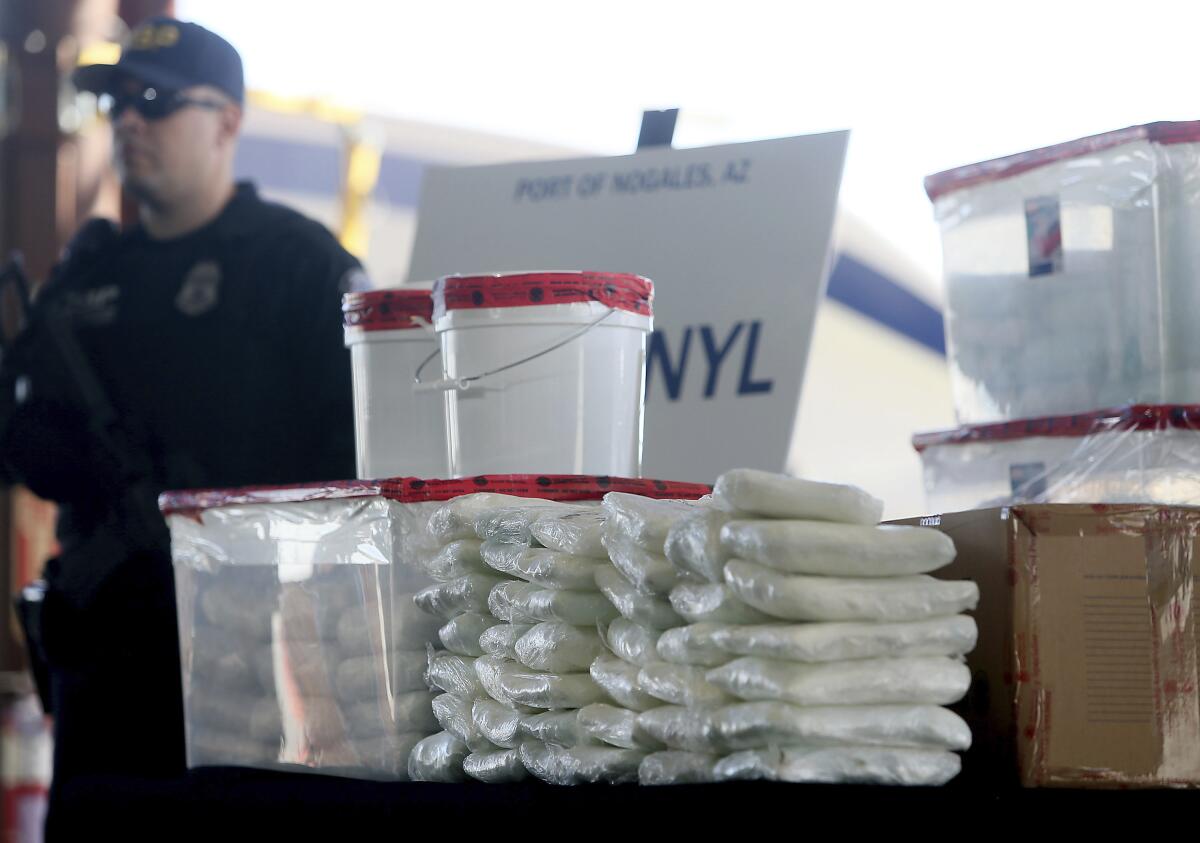Biden administration to launch global coalition to fight fentanyl

- Share via
WASHINGTON — Citing a “grave and growing” danger, the Biden administration plans to unite dozens of countries in a coalition to battle the production and trafficking of fentanyl and other synthetic drugs responsible for the deaths of thousands of people here and abroad.
Secretary of State Antony J. Blinken is scheduled Friday to host a virtual meeting of his counterparts from 84 countries to propose law enforcement and public health strategies to confront the massive worldwide opioid trade, the State Department said.
“Recognizing the urgent need for collective action, the United States is rallying the international community to address this pressing challenge head-on,” Blinken said ahead of Friday’s session.
Synthetic opioid fentanyl has turbocharged the devastating addiction crisis in the United States and has been found in heroin, cocaine, pills and other substances with often deadly consequences for users.
Fentanyl is now the leading cause of death for Americans under the age of 50, the State Department says. In the 12-month period ending in January 2022, 107,375 people in the United States died of drug overdoses, 67% of which involved synthetic opioids such as fentanyl, according to the U.S. Centers for Disease Control and Prevention.
But it is not clear what effect the new coalition will have, especially since one key country involved in the production and smuggling of fentanyl, China, is not expected to participate, and it is unclear whether Mexico, another cog in the supply chain, will take part.
‘’Our hope is that all responsible countries will eventually participate between now and over the next year,” Todd Robinson, assistant secretary of State for law enforcement and narcotics, said in a briefing Thursday.
The Biden administration regards China as a major producer of the precursor chemicals used to make fentanyl. Beijing counters that the U.S. is seeking scapegoats for its own runaway drug abuse crisis.
Chinese producers ship the chemicals to Mexico, where fentanyl is produced and then sent into the U.S., American officials say. Robinson said the Biden administration believes that, despite poor relations between Washington and Beijing, it can continue to seek cooperation to “stop criminal diversion” of illicit chemicals.
But Mexico’s president, Andrés Manuel López Obrador, has refused to recognize his country’s role in fentanyl traffic, even as his military has destroyed laboratories used to produce the product. The problem, he has said, rests with the U.S. and its drug addiction problem.
“It is hard to imagine how [the U.S. initiative] has immediate impact on synthetic drug deaths in the U.S.,” said Andrew Rudman, director of the Mexico Institute at the Wilson Center think tank in Washington.
In an effort to disrupt the China-Mexico-U.S. supply chain for fentanyl, U.S. federal prosecutors last month indicted four Chinese companies and eight individuals suspected of supplying the chemicals — often disguised as items such as dog food or nuts when smuggled — to Mexican drug cartels. Anne Milgram, administrator of the Drug Enforcement Administration, said in unveiling the indictment that fentanyl represented “the greatest threat to Americans today.’’
The Biden administration’s new action comes as a small but loud chorus of Republican lawmakers is advocating for U.S. military action against Mexico, on the pretext of stopping shipments of fentanyl. A number of GOP hard-liners and aspiring presidential candidates have said sending troops into Mexico would stop the flow of drugs, a proposal that seems to overlook history: An incursion into Mexico more than a century ago proved disastrous for U.S.-Mexico relations.
More to Read
Get the L.A. Times Politics newsletter
Deeply reported insights into legislation, politics and policy from Sacramento, Washington and beyond. In your inbox twice per week.
You may occasionally receive promotional content from the Los Angeles Times.











